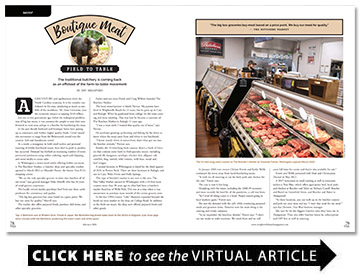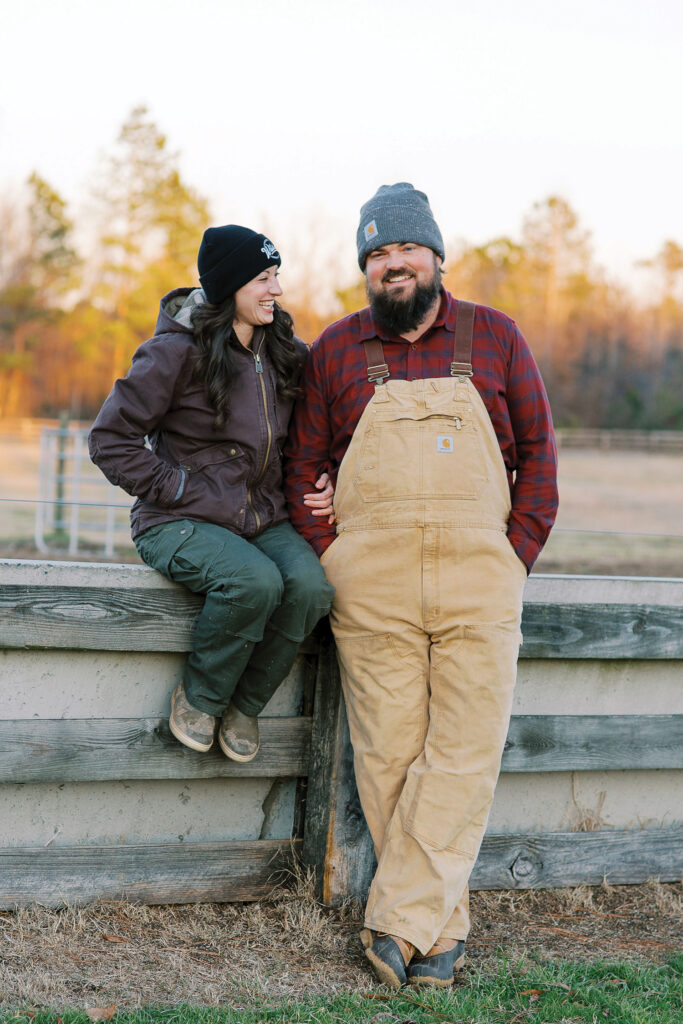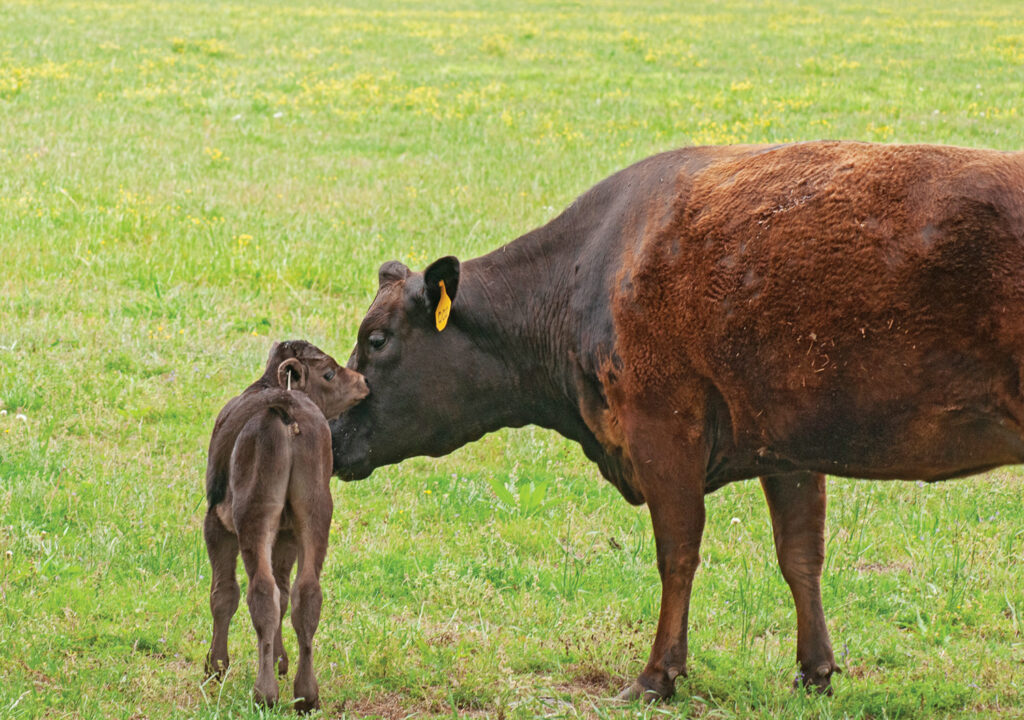Boutique Meat
The traditional butchery is coming back as an offshoot of the farm-to-table movement
BY Pat Bradford
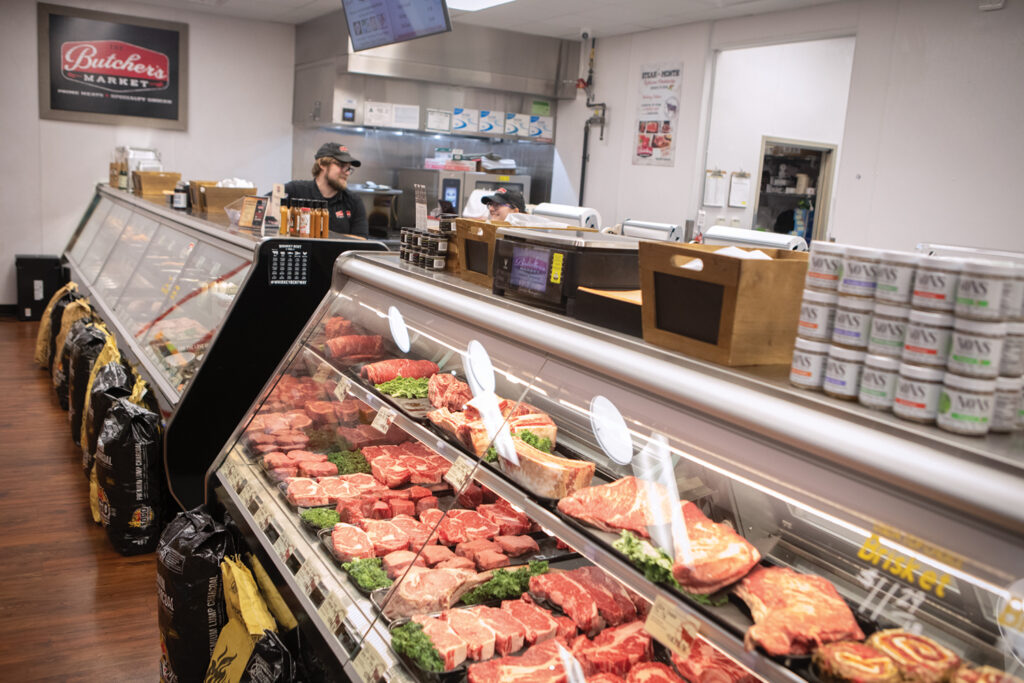
Agriculture and agribusiness drive the North Carolina economy. It is the number one industry in the state, employing as much as one-fifth of the workforce. NC State University cites the economic impact as topping $103 billion.
Just one to two generations ago, before the widespread proliferation of big box stores, it was common for people to raise their own livestock in rural areas and go to a butcher for butchering the meat.
In the past decade backyard and boutique farms have sprung up as consumers seek fresher, higher quality foods. Covid caused this movement to surge from the Birkenstock crowd into the country club and boardroom crowd.
As a result, a resurgence in both retail outlets and personal sourcing of freshly butchered meats, from beef to pork to poultry, has occurred. Demand has birthed an increasing number of entrepreneurial producers using online ordering, rapid cold shipping, and social media to create sales.
In Wilmington a newer retail outlet offering freshly cut meats is The Butchers Market, a butcher shop and specialty market opened in March 2022 at Oleander Pointe, the former Toys R Us shopping center.
“We are the only specialty grocery in town that butchers all of our meat,” says general manager Mike Murrill, who has 30 years of retail grocery experience.
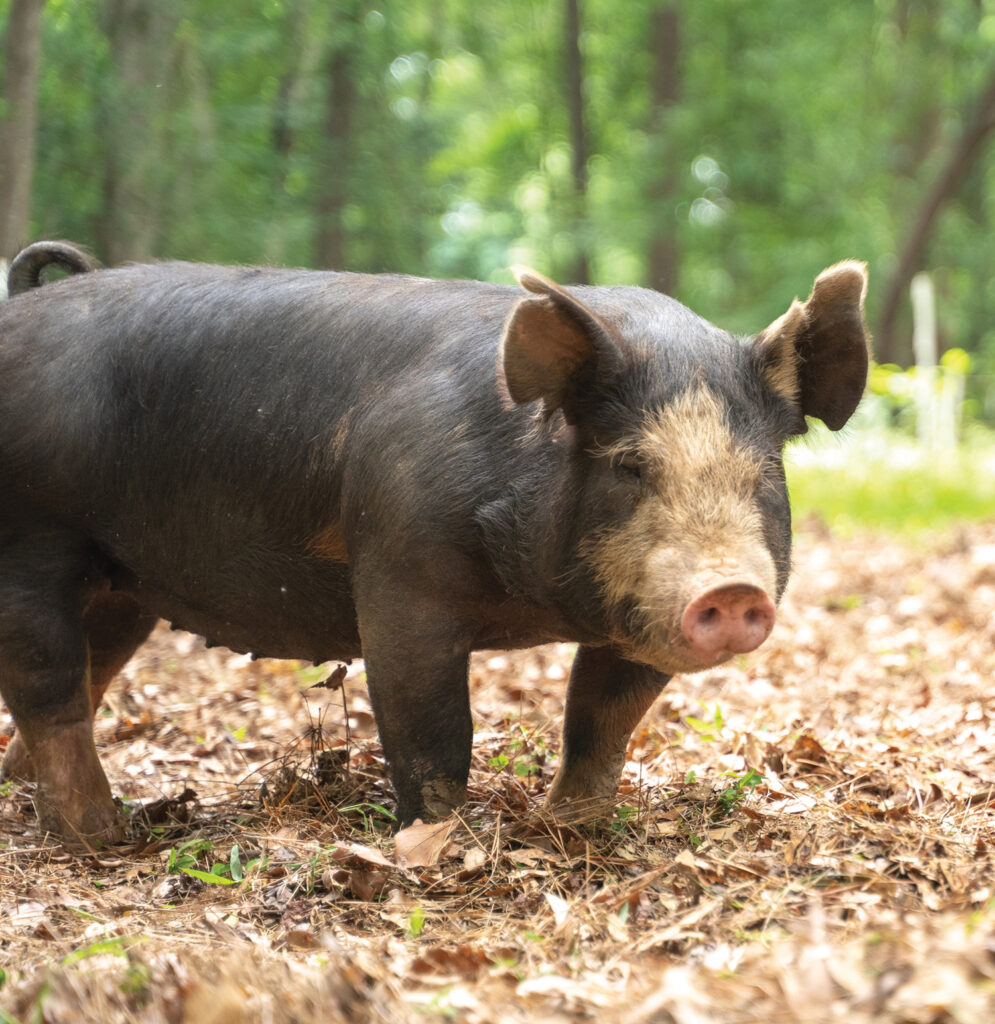
The locally owned market purchases beef from just three cattle producers for consistency and quality.
“The big box groceries buy meat based on a price point. We buy our meat for quality,” Murrill says.
The market also offers prepared foods, produce, deli items, and other specialty groceries.
Father-and-son team Derek and Craig Wilkins founded The Butchers Market.
The local owner/partner is Smith Prevost. His parents have lived in Wrightsville Beach for 15 years, but he grew up in Cary and Raleigh. When he graduated from college, he did some catering and meat smoking. That was how he became a customer of The Butchers Market in Raleigh 11 years ago.
“I was a meat snob, I wanted that quality cut of meat,” says Prevost.
He attributes growing up hunting and fishing for his desire to know where the meat came from and where it was butchered.
“I know exactly where it comes from, that’s what got me into the butcher attitude,” Prevost says.
Besides the 55-foot-long fresh counter there’s a bank of freezers that contain some hard-to-find-specialty meats, including ground elk, kangaroo, antelope, chicken feet, alligator tail, crawfish, frog, ostrich, wild venison, wild boar, oxtail and beef tongue.
A second location in Wilmington is slated for the third quarter of 2024 in Porters Neck. There are three locations in Raleigh, and one in Cary, Wake Forest and Holly Springs.
This type of butcher’s market is not new to the area. The Pine Valley Market opened in Wilmington with a 24-foot meat counter more than 20 years ago in what had been a butcher’s market franchise of Wells Pork. This was at a time when it was uncommon to purchase meat outside of the corner grocery store.
In the late 1990s Lauren “Lolo” Shannon expanded beyond the hand-cut meat market in the shop on College Road. In addition to the fresh-cut meats, the shop now offered prepared foods and other goods.
In January 2003 new owners Christie Feretti and Kathy Webb continued the move away from hand-butchering meats.
“It took me all morning to cut the beef, pork and chicken for the case,” Feretti says.
The case is now 6 feet long.
Morphing with the times, including the 2008-09 recession and most recently the hard hit of the pandemic, a café was born.
“In Covid all things came to a head. People started going to local markets again,” Feretti says.
She met the demand with the café, while continuing prepared meals and gourmet items. However now the main thing is the catering and events company.
“As we expanded, the butchery shrunk,” Feretti says. “I don’t cut our steaks to order anymore. We stock them and we still carry full loins for events and they’re also available for sale.”
Feretti and Webb partnered with Matt and Christyanna Durand in May 2022.
A 2017 newcomer in retail catering as well as restaurant outlets is True Blue, which offers aged prime beef, local pork, and chicken at Butcher and Table on Military Cutoff, Butcher and Barrel on Greenfield Street, and Butcher and Baker in Hampstead.
“At these locations, you can walk up to the butcher counter and pick out your meat and say, ‘I want that steak for my meal,’” says Kat Dennett, True Blue business manager.
She says by far the biggest butcher sales they have are in Hampstead. They also offer butcher boxes by subscription and DIY kits as well as catering.
Moving out into the field, raising and breeding the livestock are Wilders, a farm in Turkey, North Carolina, and Northwest Land and Cattle in Leland. There are numerous other smaller operations that sell farm-raised meat at area farmers markets.
Wilders is a farming venture in Sampson County created at Christmas 2021, in the aftermath of the pandemic.
Husband and wife real estate development and construction team Reid and Jaclyn Smith expanded from their six business ventures in Clayton, North Carolina, into converting a 1,200-acre former equestrian estate for raising and breeding livestock.
Reid’s father raised Simmental cattle in Clayton as he was growing up and he says he really wanted to get back to it.
During the Covid-imposed shutdown, the couple and their children moved into farming on their 40-acre Clayton farm, buying their first Wagyu cows. Their herd grew to 100 and they were looking for contiguous acreage to have their livestock, grow their own food for them and the livestock, plus add a social aspect to it. They closed on the Sampson County, 1,200-acre former Longhorn Creek Ranch two days before Christmas 2021. The next day they loaded up their cattle and children and celebrated the holiday on the farm in a travel trailer.
Wagyu is literally translated as “Japanese cows.” The meat is described as beef with a rich creamy, buttery taste. With strict registration and DNA parentage testing, pure Wagyu is the most expensive beef money can buy.
Reid and Jaclyn are able to trace all their cows back to their original lineage.
“We know dating back four to five generations what their lineage is. We actually use that in our matings, as we are trying to improve our genetics,” says Reid.
In addition to the Wagyu beef herd, now numbering 575 head, Wilders raises Berkshire pigs with 15 breeding sows and 2 boars.
All the cows and hogs are free range. The cows are grass fed and grain finished. Reid says the intent is to not use any hormones or medicines, or even grain, except at the end for flavoring. The Wilders farm also grows crops to feed the animals, including corn, soy and silage.
Wilders meats are sold at farmers markets in the Wilmington and Wrightsville area. There is also a freezer assortment at Motts Channel Seafood.
The new Wilders General Store is open on the farm in Turkey, N.C. A retail shop and parent company RiverWild’s headquarters are on Main Street in Clayton in the former North Carolina Paper Company building. All products ordered online are shipped frozen straight to the consumer’s door. The social media presence is strong.
RiverWild’s 140 plus employees are all encouraged to spend time on the farm.
“We’ve tried to open that up to employees to experience agriculture. A lot of our employees say that’s their only chance to be on a farm, to experience that,” Jaclyn says.
They are creating an agricultural experience for the public through agritourism at the farm.
“Our goal, our message, is support your local farmer, buy from your local farmer,” Reid says.
Founded in 1898, Leland’s Northwest Land and Cattle’s operation is multigenerational on both sides of the family tree. AJ Stanaland is a fifth-generation Brunswick County farmer with a passion for agriculture. Her husband, Wade, is also a fifth-generation farmer. At W & S Farms in Bladenboro, North Carolina, they also farm approximately 4,000 acres with Wade’s father.
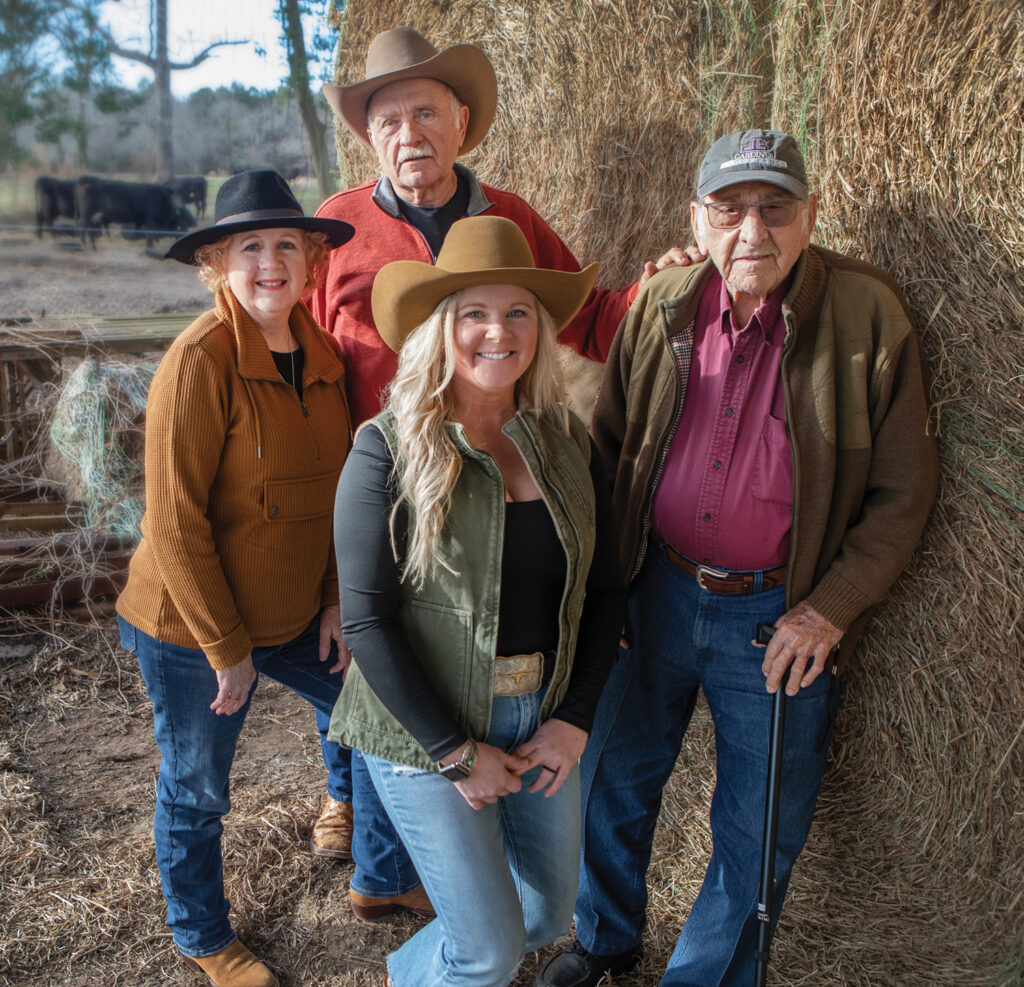
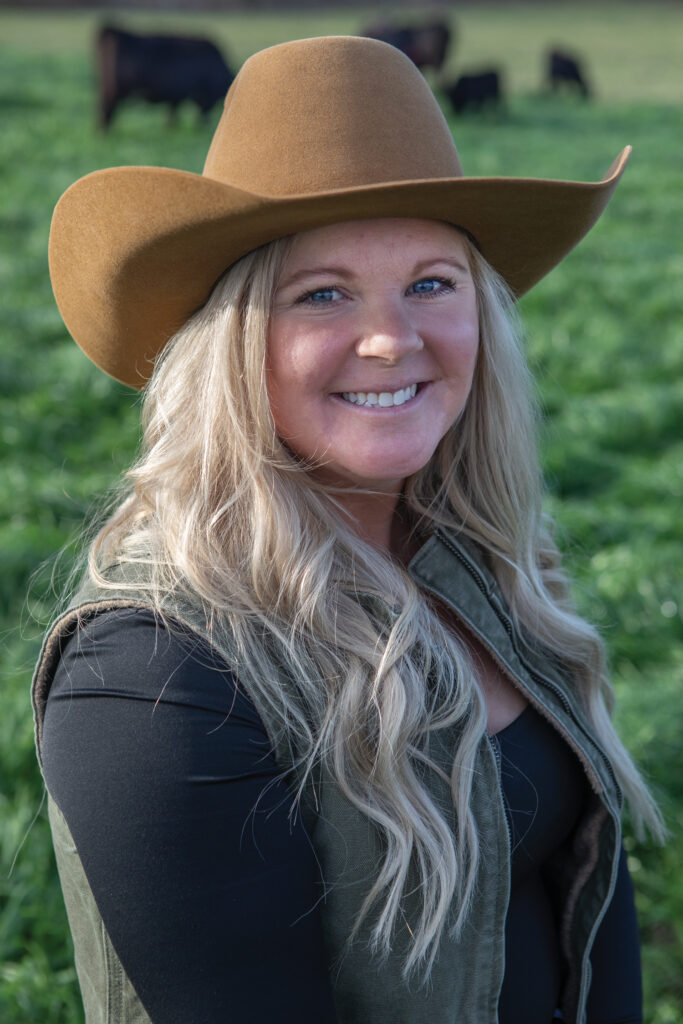
Together they are raising children, crops, cattle and hogs. Twin sons are competing in goat roping rodeo events.
The Northwest Angus beef cattle herd numbers 650, and along with heritage hogs on 650 acres, they grow haylage of sorghum, ryegrass and oats, along with Bermuda hay and bale peanut hay. Row crops are peanuts, corn and soybeans.
Moving away from the way the family had always sold their meat, AJ started selling direct to the consumer in 2019, with personal deliveries and online sales. Her storefront opened in 2021 with a small grant from the North Carolina Tobacco Trust Fund Commission.
Her great-great grandfather Gaylord created the pack house, where the family once packed tobacco to go to market. The family repurposed it. Half of the facility is used to pack and ship meat directly to consumers, while the other half is a storefront open six days a week. The company also offers an after-hours freezer pick up for online orders.
“Our main thing is the farm club subscription, which gives the consumer a discount for beef and pork purchases,” AJ says.
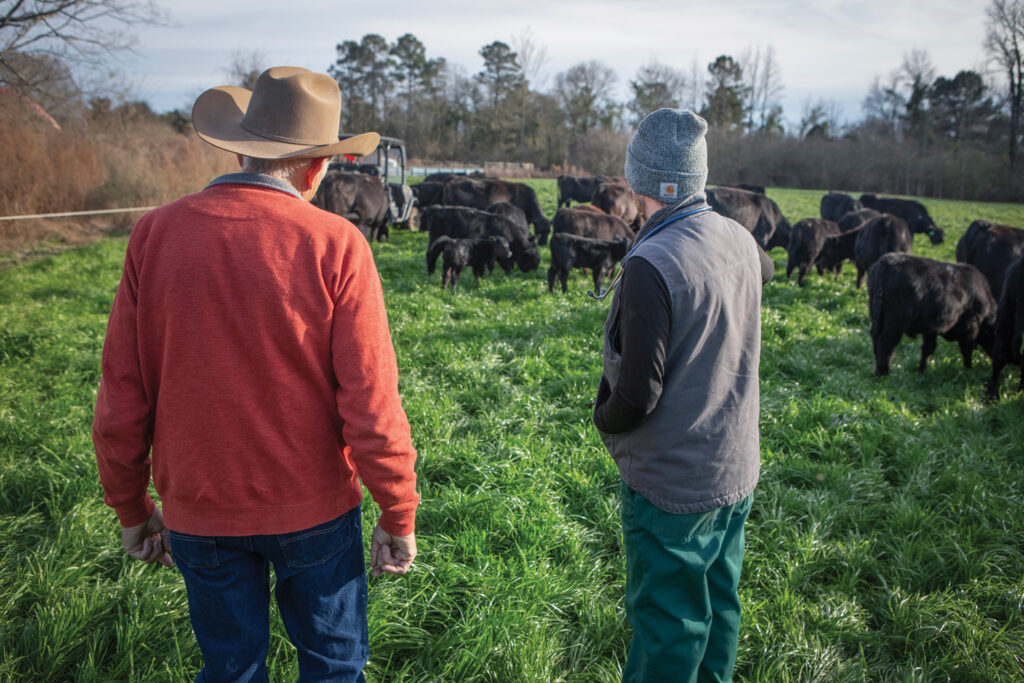
The family is also growing an agritourism event space used in the fall with a feed lot and a pumpkin patch, live music, food trucks, vendors, and kids’ activities. Everything is updated to the public via social media.
Both Wilders and Northwest Land and Cattle offer seasonal reservations for whole and half cows for bulk purchase.

